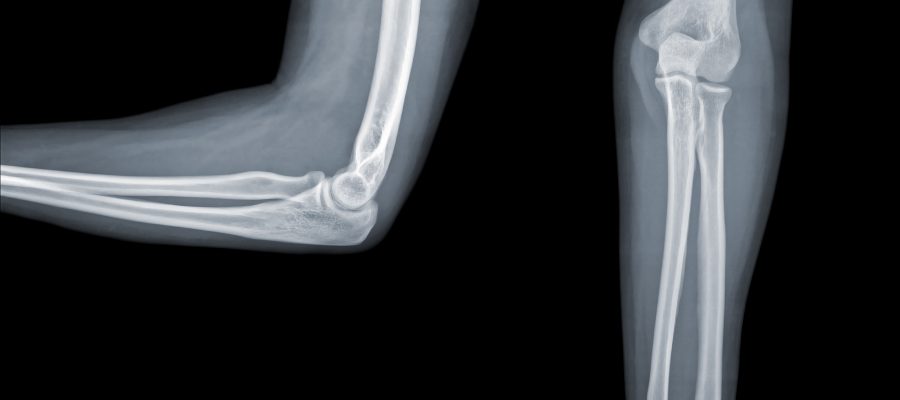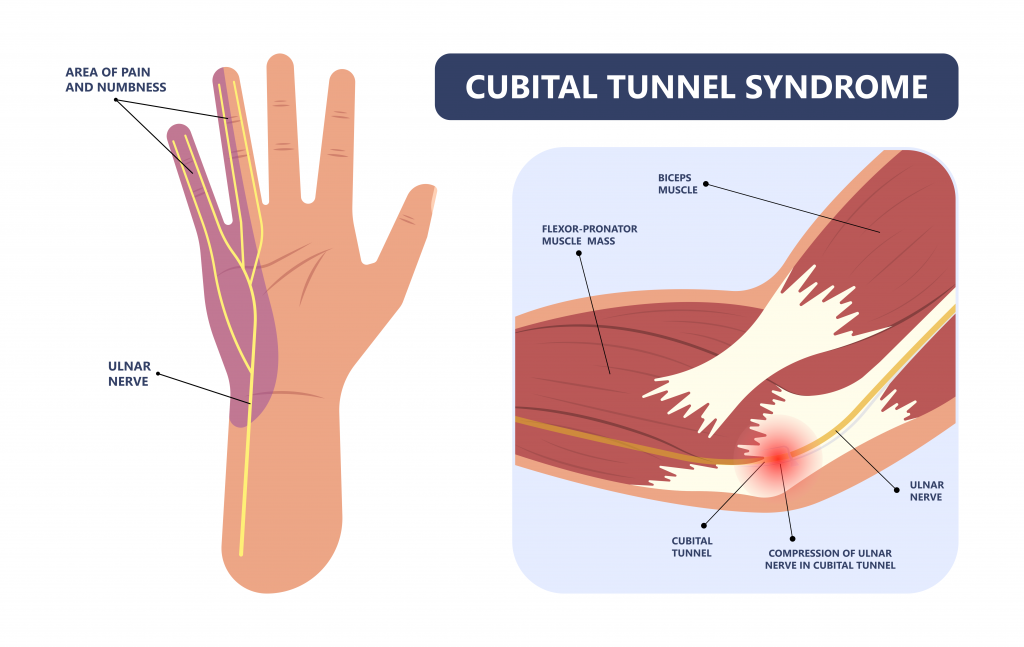
Introduction
When surrounding tissues, such as bones, cartilage, muscles, or tendons put too much pressure on a nerve around the elbow joint, it results in nerve impingement – often known as a pinched nerve. This pressure may cause discomfort, weakness, tingling, or numbness over the ring and little fingers as well as the hand. One common condition around the elbow joint is called the Cubital Tunnel Syndrome – which is the second most common pinched nerve condition in the arm and more prevalent as one ages.
Cubital Tunnel Syndrome occurs when there is compression of the Ulna nerve on the inner (Medial) aspect of the elbow. In most cases, the nerve compression increases gradually and symptoms may worsen over time. Mild cases may be managed cautiously (non-surgical), however when the symptoms become more severe, surgery is often needed to prevent permanent damage and chronic pain.

Signs & Symptoms
Symptoms of Cubital Tunnel Syndrome may include:
Diminished sensation (numbness) in the area supplied by the nerve
Sharp, burning discomfort that radiates down the arm
Tingling or “Pins and Needles” sensation (paresthesia)
Weakening of affected muscles
Deformity of some fingers
Causes
The exact cause of cubital tunnel syndrome is not known but here are a number of factors that can cause pressure on the nerve at the elbow:
- Poor posture or repetitive motions that put pressure on the elbow joint
- Direct trauma to the inside of the elbow such as fractures and dislocation at the elbow
- Swelling and inflammation of surrounding tissues because of the injury or medical conditions
Cubital Tunnel Syndrome is caused by a variety of conditions such as:
Inflammatory Arthritis conditions
Osteoarthritis with bone spurs in the joint
High intensity Hobbies or Athletic pursuits involving the arms
Manual labour jobs requiring frequent arm bending and lifting
Diagnosis
Our doctor will first ask you some questions about your condition, how it currently affects your lifestyle and your previous lifestyle. He will then proceed with a careful examination of your elbow, the Ulna nerve function and determine the extent of your functional limitation.
Radiographs (X-Rays) are often used to identify potential causes of Cubital Tunnel Syndrome. Additional imaging such as an MRI and Nerve Conduction Test may be needed to assess the severity of the condition.
If you suspect you have Cubital Tunnel Syndrome, it is important to seek medical attention from an orthopaedic specialist (Total Orthopaedic Care & Surgery).
Treatment
After assessing your condition, our doctor will recommend treatment options based on the underlying cause and severity of the condition. Other factors such as age, overall health, functional requirements and activity level must also be taken into consideration when deciding on a course of action.
Treatment for Cubital Tunnel Syndrome may include:
- Non-Surgical: Rest, anti-inflammatory medication, wear a splint to straighten the elbow at night and during high-risk activities.
- Surgical: For severe cases where non-surgical treatment has failed or symptoms (severe weakness or wasting of muscles) or are worsening, surgery may be recommended. The procedure involves decompressing the nerve by creating more space for it to move freely. This helps to increase blood flow, which aids in the promotion of healing within the affected area.
Treatment
While Cubital Tunnel Syndrome cannot always be prevented, these are steps you can take to reduce your risk:
- Take frequent breaks from repetitive motions that put pressure on the elbow joint
- Use proper ergonomic techniques when performing manual labour or athletic activities involving the arms
- Strengthen and stretch the muscles around the elbow joint to decrease pressure on the nerve
- Avoid putting prolonged pressure on the inside of the elbow, such as leaning on your elbows for extended periods of time.
Conclusion
It is important to follow your orthopaedic specialist’s (Total Orthopaedic Care & Surgery) instructions for treatment and rehabilitation to ensure the best possible outcome for your Cubital Tunnel Syndrome (Nerve impingement). If you suspect you have a Cubital Tunnel Syndrome (Nerve Impingement), do make an appointment with an experienced orthopaedic elbow specialist (Total Orthopaedic Care & Surgery) for a detailed assessment of your elbow condition.



